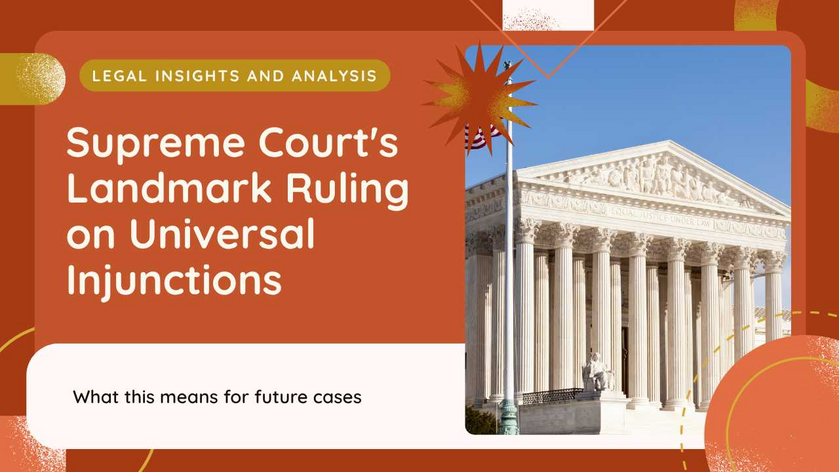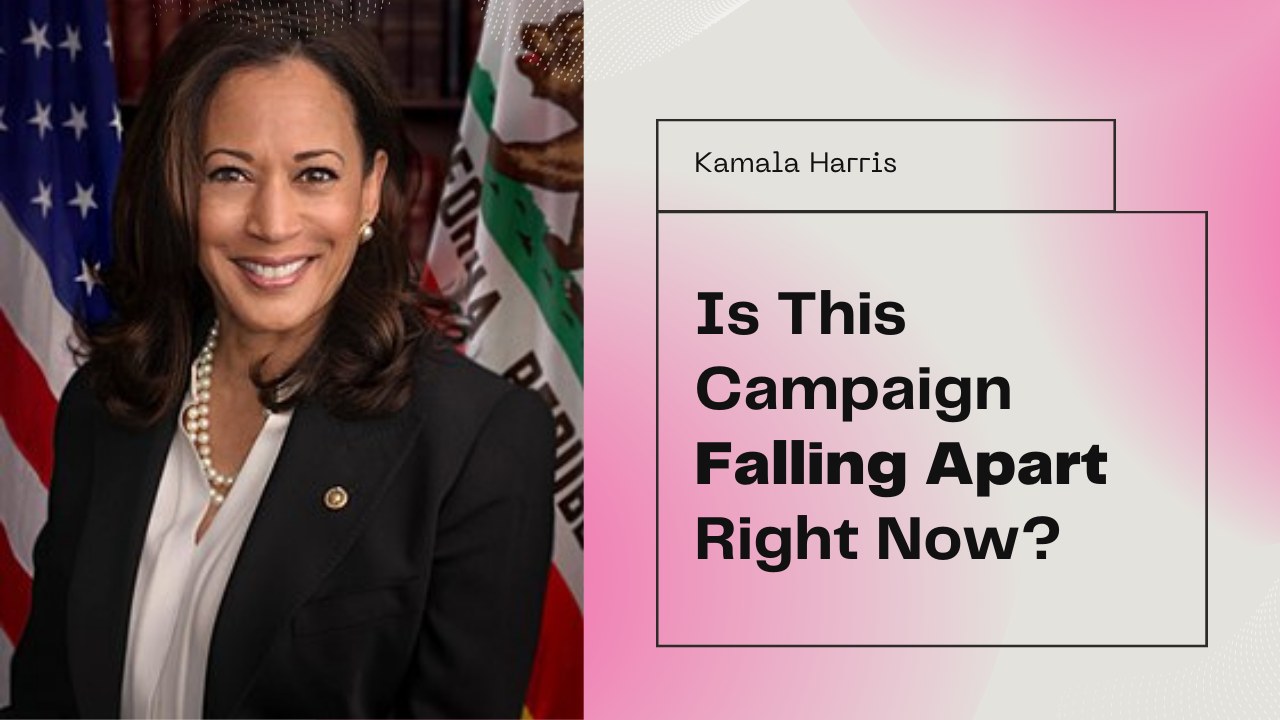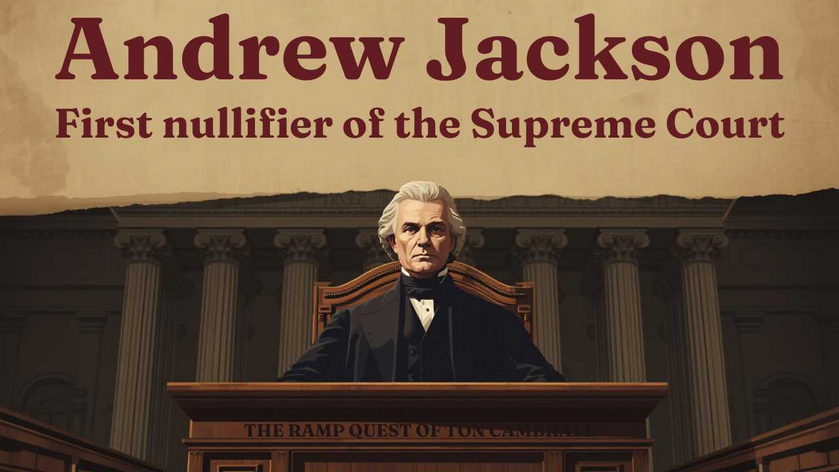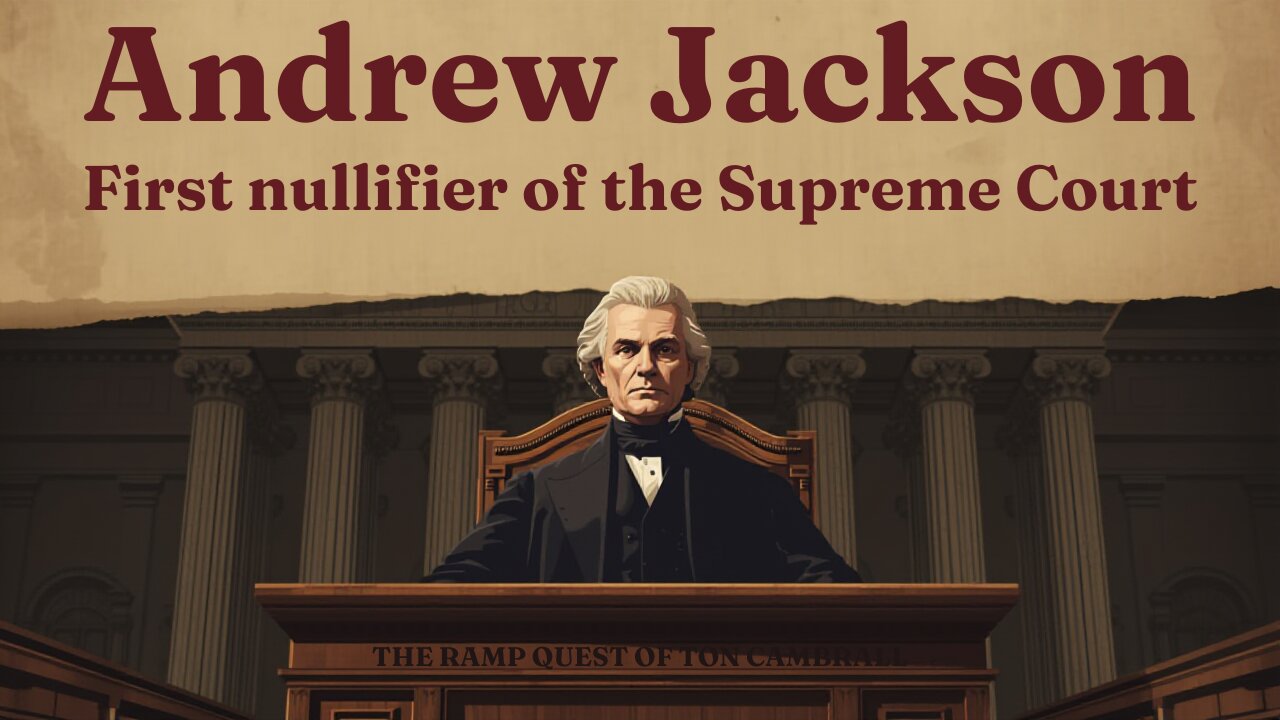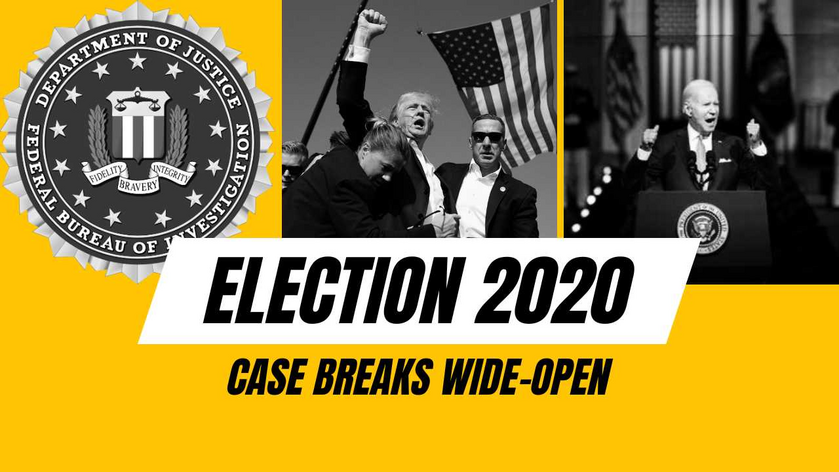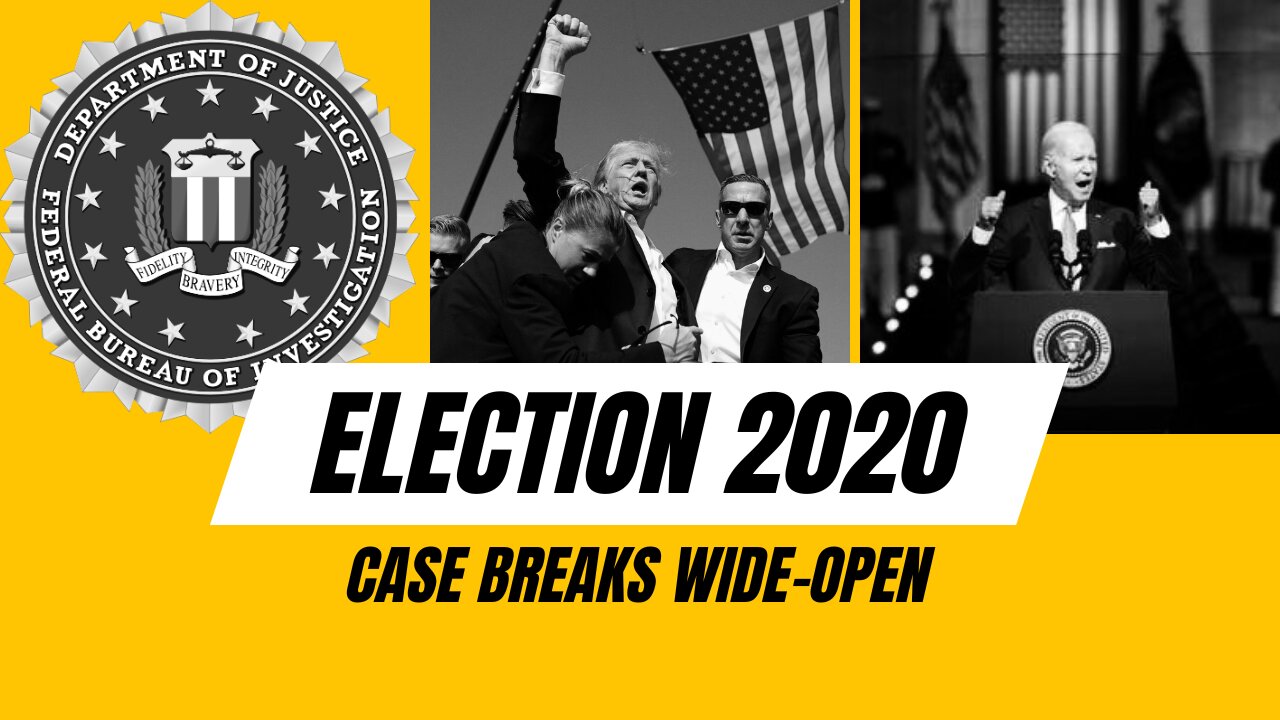On the last Friday of its term, the United States Supreme Court finally laid down the law on universal injunctions. Simply put, the Court forbids the federal trial bench – the District Court judges – to issue them. From now on, anyone seeking an injunction with nationwide import must file a class action – the old-fashioned way. Most commentators have totally missed the significance of this ruling, because everyone’s concentrating on the cases behind the consolidated Applications for Stay that President Donald J. Trump filed. This ruling – a rare instance of a full-blown Battle of Opinions on an application for stay, not a writ of certiorari – carries implications far beyond “birthright citizenship,” the subject matter of the cases at hand. The Court’s Institutionalists have finally gotten fed up with trial judges usurping their authority, and have now reasserted it. No one can properly understand the ruling, apart from that fact.
The actual makeup of the present Court
To understand what happened last Friday, remember that the Court does not have only two blocs, the conservative and the liberal. Instead, it has three:
Originalists – Justices Clarence Thomas, Samuel A. Alito and Neil Gorsuch (in order of seniority of service),
Equitarians – Justices Sonia Sotomayor, Elena Kagan, and Ketanji Brown Jackson, and
Institutionalists – Chief Justice John Roberts and Justices Brett Kavanaugh and Amy Coney Barrett.
Originalists need little introduction to understand their role and their desires in the cases they review. Equitarians try to assert equity powers that the Supreme Court does not have. (They also sympathize with trial judges, who do have equity powers, when said trial judges abuse those powers.)
Institutionalists have only one loyalty: to the institution that we call “Supreme Court of the United States of America.” To a lesser degree, they extend their loyalty to the entire national judiciary. Anything that threatens the authority or the reputation of the national judiciary, and/or the Supreme Court, is their enemy.
In the present three-bloc structure of the Court, the Institutionalists rule. Rarely do the Institutionalists split on any given case. That they side more often with the Originalists than with the Equitarians, merely reflects the confluence of interests of Institutionalists and Originalists in most cases. Sometimes – as in FCC v. Consumers’ Research, also decided Friday – the Institutionalists side the Equitarians. But not often – and definitely not in the three cases at hand.
Three universal injunctions at issue
The cases at hand are named Donald J. Trump, President of the United States, versus:
CASA (Central American Solidarity Association),
State of Washington, and
State of New Jersey.
These three cases all concern the notion of “birthright citizenship.” According to it, any person born on American soil, regardless of the citizenship or residency status of mother or father, is a citizen. The Latin phrase for this principle is jus soli – the Law of the Soil. But contrary to popular belief, jus soli is not a holding of Roman law. Jus sanguinis (whereby a born person inherits the citizenship of his or her parents) is a part of Roman law.
President Donald Trump sought to abolish birthright citizenship with his Executive Order 14160, “Protecting the Meaning and Value of American Citizenship.” Almost at once, CASA and the States of Washington and New Jersey sued, both on their own behalf and in behalf of several pregnant women who hoped to have citizenship extended automatically to their children as soon as they were born. These birth tourists have two interests in acquiring citizenship for their children by these means:
Defined charitable benefits the government extends to citizens, and
A means by which the “birth tourists” involved can obtain citizenship for themselves.
The governments of Washington and New Jersey apparently want to protect Democratic Party control of their States. Mendicants overwhelmingly vote Democratic. CASA has a conflict of interest. “Central American solidarity,” by definition, cannot square with patriotism.
Applications for partial stay of the universal injunctions
President Trump filed an application for partial stay of each of the universal injunctions in those three cases. Those cases found their way to the Supreme Court. (Docket Nos. 24A884, 24A885, 24A886.) On May 15, 2025, the Court took the unusual step of hearing oral argument on those three applications. That step was unusual because the Court does not ordinarily hear argument on applications for stay. Furthermore, the Court does not hear argument on any kind of case in the month of May.
The argument transcript should have given everyone the vital clue to Friday’s decision. In particular, Justice Thomas – who, as senior serving (and living) Justice, always opens questions at oral argument – asked Solicitor General D. John Sauer to expound on the history of universal injunctions. Mr. Sauer addressed a specific analogy upon which the lower courts relied: a bill of peace in English courts. Sauer argued – and Thomas accepted – that class actions are the modern analogs of bills of peace.
In fact, the Court has been down this road before. Trump v. Hawaii, 585 U.S. ____ (2018). That was another immigration-related case, involving the barring of nationals from foreign countries that refused to provide enough information to “vet” said nationals. The Court voted 5-4 to uphold President Trump (first term) in that matter. More to the point, that case also had involved a universal injunction. Justice Thomas had warned then that the Court would have to review universal injunctions, as to their appropriateness, propriety – and authorization.
The main opinion forbids universal injunctions
Justice Amy Coney Barrett – most junior in age and second most junior in service – delivered the opinion of the Court. As plainly as she could write, she said universal injunctions have no authorization in the Judiciary Act of 1789. (This is the act that first “ordained and established” the first “inferior courts” according to Article III.) The Judiciary Act grants the equity powers the District Courts enjoy. Those powers extend only to the grant of complete relief to particular plaintiffs before the court in question. Universal relief is not a valid equity power under the Judiciary Act.
In particular, in the immediate post-colonial era, individuals brought suit against other individuals. And, like Justice Thomas before her (in his concurrence in Hawaii), she compares bills of peace to class actions.
Rule 23 of the Federal Rules of Civil Procedure lays out what class actions are, who may file them, and how to handle them. Rule 23(a) sets out the prerequisites of all class actions:
One or more members of a class may sue or be sued as representative parties on behalf of all members only if:
(1) the class is so numerous that joinder of all members is impracticable;
(2) there are questions of law or fact common to the class;
(3) the claims or defenses of the representative parties are typical of the claims or defenses of the class; and
(4) the representative parties will fairly and adequately protect the interests of the class.
Barrett (and her colleague Justice Kavanaugh, concurring) cite Rule 23(b)(2), which reads:
A class action may be maintained if Rule 23(a) is satisfied and if … the party opposing the class has acted or refused to act on grounds that apply generally to the class, so that final injunctive relief or corresponding declaratory relief is appropriate respecting the class as a whole.
In this case, the opposing party is President Trump, and his action – EO 14160 – applies generally to a hypothetical class. Indeed Justice Kavanaugh reminded the respondents that they can go back to their trial courts and seek class certification.
Dissenting opinions
Barrett astutely observed that the respondents were trying to work around this rule. So also did Justice Sotomayor, who breathlessly (in dissent) said,
The Court’s decision is nothing less than an open invitation for the Government to bypass the Constitution.
In fact, the bulk of Sotomayor’s dissent is a defense, not of universal injunctions but of birthright citizenship itself. Neither Barrett nor either of the concurring Justices (Thomas and Kavanaugh) addressed that issue. The only matter before the Supreme Court in those cases was the idea of universal injunctions.
So why did Sotomayor (and Jackson) spend so much time defending birthright citizenship? Why did they boast that the administration did not seek a stay or vacatur of the injunctions as applied to particular pregnant women? Perhaps because they knew that a Rule 23 class will be inherently more difficult to certify. And perhaps because they know that the merits might not favor birthright citizenship nearly as much as they suppose.
Sotomayor doesn’t seem to realize how socialistic she sounds. She laments that children ultimately denied citizenship will lose “critical public services, like [Supplemental Nutritional Assistance Program] and Medicaid.” If that’s all that citizenship means to Justice Sotomayor, that’s all the more reason to question the wisdom of her appointment to the Court. Then she suggests American-born children would be stateless. Not so. Those children would be citizens or subjects of the nation-state of their mothers.
But here Sotomayor plumbs the depths of absurdity:
If allowed to take effect, the Order may even wrench newborns from the arms of parents lawfully in the United States, for it purports to strip citizenship from the children of parents legally present on a temporary basis… Those newborns could face deportation, even as their parents remain lawfully in the country.
No one has so alleged. All that would happen is that the children would have to go back when their parents’ visas have expired.
The Jackson dissent
Justice Jackson dismisses the analysis of English court rules in the Framing era as “a smokescreen.” All that matters to her is whether a federal court can “order the Executive to follow the law.” She insists that this is, and by right ought to be, the prerogative of any federal court at any level.
Here Jackson descends to a colloquialism totally unbecoming a judge:
As I understand the concern, in this clash over the respective powers of two coordinate branches of Government, the majority sees a power grab—but not by a presumably lawless Executive choosing to act in a manner that flouts the plain text of the Constitution. Instead, to the majority, the power-hungry actors are . . . (wait for it) . . . the district courts.
Wait for it!? Social-media influencers use that expression. Judges and Justices do not – or did not until now.
In fact the usurpation of authority by lower courts lies at the heart of the matter before the Supreme Court. Again, the Institutionalists finally decided that they could no longer tolerate district courts acting like the Supreme Court they’re not.
Nor could the Institutionalists tolerate district courts bringing the entire national judiciary into disrepute. Barrett set a new record of tartness in chiding her colleague:
We will not dwell on JUSTICE JACKSON’s argument, which is at odds with more than two centuries’ worth of precedent, not to mention the Constitution itself. We observe only this: JUSTICE JACKSON decries an imperial Executive while embracing an imperial Judiciary.
To demonstrate this, Barrett cites the very case that established the principle of judicial review. Marbury v. Madison, 1 Cranch 137 (1803). Marbury had sought a writ of mandamus against James Madison – and the Court refused the request. They concluded that they hadn’t the authority so to act – and no Act of Congress could give them that authority. In other words, Barrett sent Jackson back, not merely to law school, but to high school, to re-learn civics.
The future of universal injunctions – and birthright citizenship
To repeat, universal injunctions have no future. No longer may judges issue injunctions out of their jurisdiction – not without first certifying an action-taking class. To do that, judges will have to take briefings and hold hearings on certification of classes, per Rule 23. (Note that Ben Weingarten of The Federalist observed that then-President Joe Biden also objected to universal injunctions. The shoe is clearly squeezing the other foot.)
Contrary to the breathless dissents on this partial stay, the question of birthright citizenship remains to decide. CNAV believes that the CASA entity will recruit and proceed to certify a class of persons born to non-citizen and non-permanent-lawful-resident parents. The various foundations in the George Soros financial empire will see to this.
The Babin Bill
As CNAV predicted, Rep. Brian Babin (R-Texas) did introduce a bill to define specifically who is “subject to the jurisdiction of the United States” for purposes of citizenship by birth. His Birthright Citizenship Act of 2025 (H.R. 569) would set limits on birthright citizenship on lines similar to those on Trump’s EO 14160. His bill, now with 64 co-sponsors, is sitting in the Judiciary Committee. The list of co-sponsors reads like a Who’s Who of Republicans in the news for supporting Trump’s program. They include ten Judiciary Committee members and one freshman from Virginia (Rep. John J. McGuire of Virginia’s Fifth District).
This is the only sure method of revoking birthright citizenship for children of illegal aliens. It would not overrule the famous Wong case, because both it and EO 14160 carve out exceptions for children of lawful permanent residents. But CNAV sees no reason why a bill to limit even these children to lawful permanent residency status of their own would be unconstitutional. The Wong court declared that Congress had failed to act. When Congress does act, the Institutionalists are more likely to recognize such an act as valid. They might not want to recognize EO 14160 as valid, because Presidents execute law but do not make it.
H.R. 569 is the real sleeper in this drama. The minute Alex Soros (George’s son) announces a Birthright Citizenship Legal Defense Fund, Rep. Jim Jordan (R-Ohio) should put H.R. 569 on the House Judiciary Committee calendar.
Link to:
The article:
https://cnav.news/2025/06/29/news/universal-injunctions-forbidden/
Video:
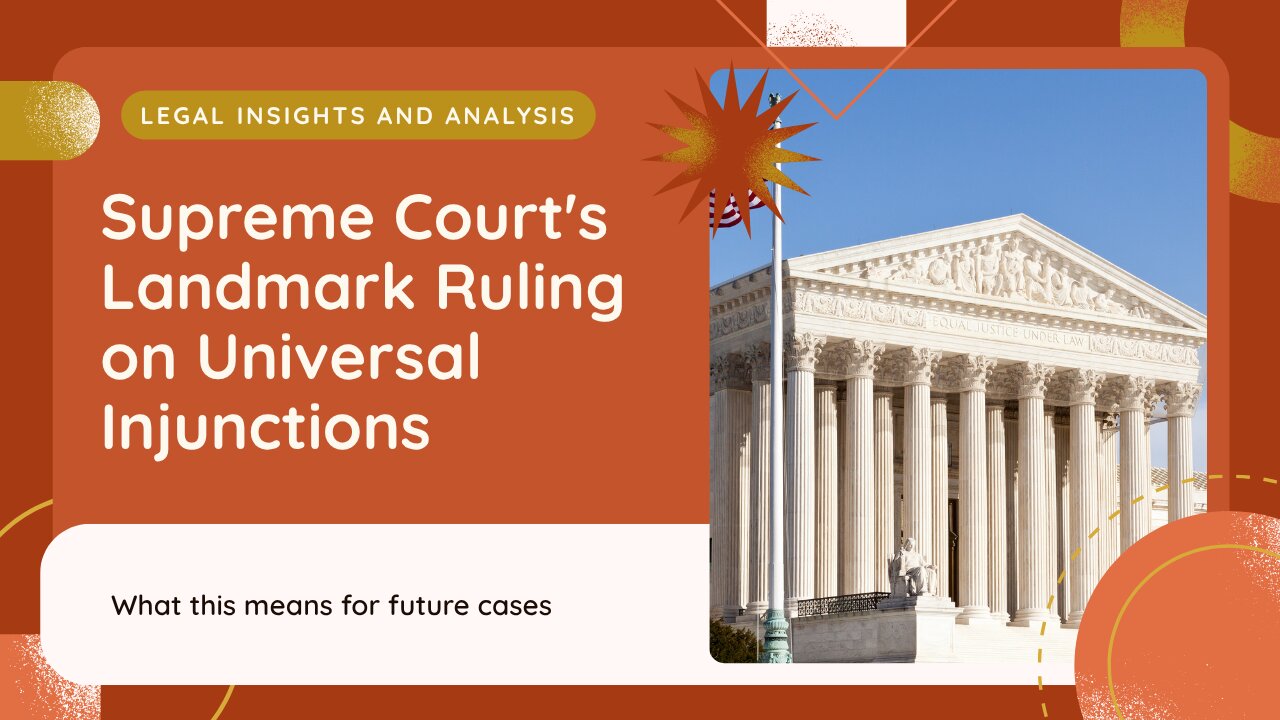
Executive Order 14160:
Trump v. CASA:
Application for Partial Stay of Injunction (Docket):
https://www.supremecourt.gov/search.aspx?filename=/docket/docketfiles/html/public/24a884.html
Transcript of oral argument:
https://www.supremecourt.gov/oral_arguments/argument_transcripts/2024/24a884_c07d.pdf
Opinion and order:
https://www.supremecourt.gov/opinions/24pdf/24a884_new_5426.pdf
FRCP Rule 23 (class actions):
https://www.law.cornell.edu/rules/frcp/rule_23
H.R. 569:
Tracking page:
https://www.govtrack.us/congress/bills/119/hr569
Co-sponsorship list:
https://www.govtrack.us/congress/bills/119/hr569/cosponsors
Declarations of Truth:
Declarations of Truth Locals Community:
https://declarationsoftruth.locals.com/
Conservative News and Views:
Clixnet Media
